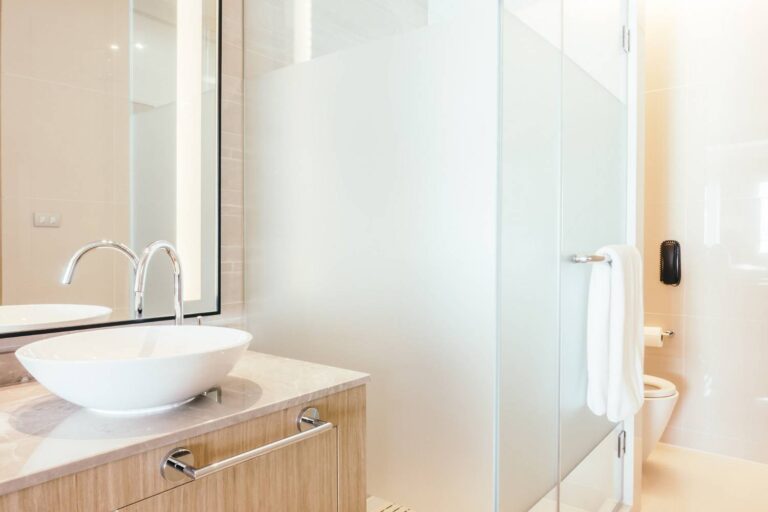Choosing the right manufacturer of prefabricated bathrooms for your project is paramount to success. Factors such as their experience, the materials they use, the level of customization they offer, and their adherence to industry standards will significantly impact the quality, efficiency, and cost-effectiveness of your project. Prefabricated bathroom pods can dramatically speed up construction timelines while maintaining a high level of precision. Selecting the right partner in modular construction requires carefully assessing suppliers and comparing their offerings.
How to Evaluate the Quality and Customization Options of Prefabricated Bathroom Manufacturers
When selecting a prefabricated bathroom manufacturer, evaluating the quality of their materials and customization options is crucial. Start by assessing the materials used; moisture-resistant panels, non-porous surfaces, and durable fixtures are essential. These materials should comply with industry standards and resist mold, corrosion, and general wear and tear over time. The best manufacturers often provide independent third-party quality certifications like ISO 9001, ensuring materials meet rigorous testing standards.
Customization is key to ensuring the bathroom pod fits seamlessly into your overall architectural and design vision. Look for manufacturers that offer a wide range of options, including layout variations, different plumbing configurations, and a variety of finishing materials. Some manufacturers offer bespoke solutions, tailoring the bathroom pod to meet specific project needs, such as accessibility features or energy-efficient components. For instance, specifying low-flow toilets and LED lighting can significantly contribute to a project’s LEED certification.
The manufacturing process is another critical factor. Inquire about their quality control measures; factory inspections and structural integrity testing are essential. Compliance with local building codes is a must. Certifications from recognized regulatory bodies ensure the manufacturer is reliable and adheres to strict standards. Ensure the manufacturer conducts thorough testing to guarantee resistance to mold, corrosion, and wear – critical for longevity and reducing lifecycle costs. These tests should align with ASTM standards relevant to bathroom materials and construction.
Before making a final decision, review completed projects and request samples. This provides a sense of their design precision and finish quality. Request references from past clients; their insights are invaluable in understanding the manufacturer’s ability to deliver consistent results within the agreed-upon timelines. Thoroughly evaluating these factors ensures that the prefabricated bathroom units meet your performance expectations and regulatory requirements. A hotel chain, for example, reduced bathroom installation time by 30% using prefabricated pods from a manufacturer known for high-quality materials and rigorous testing.
Comparing Production Capabilities and Project Experience of Different Manufacturers
When narrowing down choices for a prefabricated bathroom manufacturer, it’s vital to assess their production capabilities and the depth of their past project experience. Consider their capacity to handle projects of different sizes and complexities. Do they have the infrastructure, technology, and a skilled workforce to meet the specific demands of your project? Reviewing their previous work provides a clear idea of their expertise in different sectors, whether it’s hospitality, healthcare, or residential developments. A manufacturer specializing in healthcare projects, for instance, will be well-versed in hygiene standards and accessibility requirements.
Another critical aspect is the manufacturer’s production capacity. Evaluate their ability to deliver the units within your required timeframe while maintaining consistently high quality. Factors like automation, material sourcing, and quality control processes impact production efficiency and consistency. A well-established manufacturer should have a solid track record of completing projects on schedule without compromising design or durability. Automation not only speeds up production but also reduces the risk of human error, leading to more consistent quality.
Don’t forget to check their compliance with industry regulations and certifications. A manufacturer with the right certifications proves that their prefabricated bathrooms meet all the necessary safety, plumbing, and construction standards. Their approach to sustainability is also important – do they use energy-efficient manufacturing processes or eco-friendly materials? This is a crucial consideration, especially for projects where environmental responsibility is a priority. Look for manufacturers that have certifications such as LEED or are members of organizations promoting sustainable building practices.
Request references and case studies from previous clients. Talking to past customers provides firsthand insights into their experiences with the manufacturer’s project management, communication, and after-sales support. A manufacturer with extensive experience and a well-documented portfolio is more likely to deliver a product that meets your requirements and lives up to your expectations. Engaging with past clients can reveal potential challenges and how the manufacturer resolved them, providing a realistic view of their capabilities.
Choosing the right manufacturer of prefabricated bathrooms is crucial to ensuring quality, efficiency, and long-term durability in your project: https://domczar.co.uk/. Taking the time to do thorough research upfront pays off in the long run. Before settling on a manufacturer, ensure you have answers to these questions:
-
What specific types of prefabricated bathrooms do they specialize in (e.g., for hotels, hospitals, apartments)?
-
Can they provide detailed drawings and specifications for their standard models?
-
What is their process for handling design changes or custom requests?
-
What warranties do they offer on their prefabricated bathrooms?
-
Can they provide a list of past clients you can contact for references?
Frequently Asked Questions About Prefabricated Bathrooms
What is the typical lead time for prefabricated bathroom pods?
Lead times vary based on the manufacturer’s capacity, the complexity of the design, and the quantity of units needed. Generally, expect lead times to range from 8 to 16 weeks. Confirm this with the manufacturer and factor it into your project timeline.
How do prefabricated bathrooms impact project costs?
Prefabricated bathrooms can reduce overall project costs by minimizing on-site labor, reducing material waste, and accelerating construction timelines. However, initial costs may be higher than traditional construction methods, so evaluate the total cost of ownership, including installation and maintenance.
Are prefabricated bathrooms compliant with building codes?
Reputable manufacturers ensure their prefabricated bathrooms comply with all relevant local and national building codes. Always verify that the manufacturer has the necessary certifications and provides documentation to demonstrate compliance.
